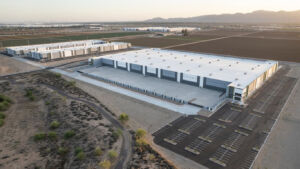The global pandemic caused a seismic shift in the retail industry. Adapting became critical for stores’ survival, forcing them to reconsider strategies and redefine customer experiences. Retail is being transformed as consumer behavior changes and new trends emerge. If you are curious about how consumer and business practices will change due to the pandemic, looking into how retail stores will adapt in the future could be a beneficial place to start.
MORE NEWS: Phoenix ranks 1st among industrial markets in 2024
Digital Transformation of Retail Shopping
Retail shopping stores have evolved in response to shifting market dynamics and digital transformation. Consumers now expect a seamless shopping experience, both online and in-store. Retailers invest in e-commerce solutions, intuitive websites, and mobile apps to enhance customer engagement. Advanced digital tools like augmented reality (AR) allow shoppers to visualize products before purchase, bridging the gap between virtual and physical shopping experiences.
Engaging Experiences
Physical stores are transforming to accommodate changing consumer behavior. They are no longer just transactional centers; they have become experiences. As part of these efforts, retailers are reimagining their floor plans to make more room for health-oriented, convenient, and innovative touchpoints to invite customers to experience products in new ways. These repurposed spaces aim to attract foot traffic by offering experiences that are not available online.
Contactless Technologies
The pandemic gave impetus to contactless adoption. Consumers now desire minimal interaction with physical objects during a transaction. Self-service kiosks, mobile payments, and contact-free delivery solutions have become almost standard. Standard technologies add convenience and address hygiene concerns that consumers continue to have. Contactless technology is essential for retailers to streamline operations and increase customer satisfaction.
Enhanced Personalization
Now, every retailer has personalization on its agenda. Insights into preferences enable businesses to customize their offerings, resulting in more impactful customer experiences. This data analytics makes this transformation possible, allowing us to gain insights into consumers’ behavior. Personalized recommendations, targeted promotions, and a tailored shopping experience contribute to customer loyalty. This move from mass communications to more customized messages mirrors a greater significance for quality, not quantity, of interaction.
Sustainability and Corporate Social Responsibility
As we all know, sustainability is increasingly becoming a trend in retail, and more and more consumers are seeking sustainable practices. Consumers are more likely to prefer companies committed to their carbon footprint. Hence, retailers ensure sustainable sourcing, waste reduction, and ethical practices. Conscious consumers increasingly demand eco-friendly packaging solutions and blockchain transparency in supply chains.
Support and Engagement in the Community
As we recover from the pandemic, another pillar of retail strategies has been fostering community involvement. Mom-and-pop stores aim to deepen bonds within neighborhoods and offer a sense of togetherness to shoppers. Get in touch by backing local causes, teaming up with local artists, and running community events. Retailers are increasingly aware of their social responsibility, seizing the opportunity to effect positive change through their platforms.
Future Outlook for Retail
Retail evolution and innovation aren’t over just yet. With rapidly changing technology, retailers will continue to enhance customer experiences. Everything from virtual shopping experiences to AI-driven customer service to even more integrated IoT devices is on the horizon. Agility and adaptability will be essential parts of any business that acts quickly on trends that may arise. Retailers willing to adapt and prioritize customer-centricity will emerge victorious in this constantly evolving environment.
Conclusion
The pandemic brought about a significant transformation in the retail industry. Retailers are also setting an entirely new shopping standard by digitizing everything, rethinking physical footprints, and becoming sustainable. Novel technologies such as contactless and personalized interactions are currently in high demand, setting new expectations. But as the world progresses, those who evolve will move the industry forward, creating a new, more sustainable future for retail.




